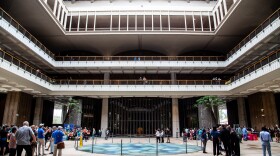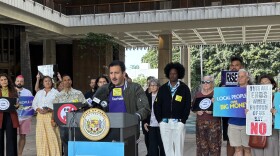A bill awaiting Gov. Josh Green's signature seeks to control the cost of prescription drugs for hospitals and health centers that care for underserved populations.
The measure aims to adjust the 340B federal program that requires pharmaceutical companies to sell drugs to hospitals that care for disadvantaged populations at a discounted rate.
Qualifying health centers pay a discounted rate for medication, but are reimbursed by insurance at the regular rate. It allows the hospital’s margin of revenue to increase.
“This is a federal program that was set up over 20 years ago across the country to recognize the fact that hospitals need additional sources of revenue to help take care of especially underserved populations,” said Hawaii Healthcare Association President Hilton Raethel.
He explained that about two years ago, drug companies stopped allowing 340B at contract pharmacies like a neighborhood Longs Drugs or Walgreens. Instead, it would only allow pharmacies in hospitals to participate in the program.
“The impact is to the hospitals, the Native Hawaiian Health Centers and the Federally Qualified Health Centers. Now for the hospitals, this is an impact roughly of about $50 million a year,” Raethel said.
“This is money that they were able to get access to because of these discounts. That was cut off.”
The funds from the 340B program support community services at the Waianae Coast Comprehensive Health Center, said Executive Director of Pharmacy & 340B Operations Aili Hallstone.
“Here at the center, the loss of the 340B revenue would force difficult decisions that could affect the health care of patients, with few resources that they already have,” she said.
“These funds are not theoretical. They really help fund the important services. With the 340B savings, we invest directly back into our community.”
Some of those services include free blister packing, assistance with memory care and outreach to homeless individuals in the area.
“The things that we do extra for our community, that's at no cost to our patients. We still do them, but it's just stretching it very thin,” Hallstone said. “We still do that, but it's hard. It's going to be hard to keep on maintaining that.”
Raethel added that the funds also go toward caring for patients who are under- or uninsured.
“If one of these patients shows up at a Federally Qualified Health Center or a hospital, they still get taken care of,” he said.
“If they show up at the emergency room, we still take care of them. They get their care. And so that's one example of how these dollars can be used to pay for that care, because you have to pay the doctors, you're going to pay if they need an X-ray, if they need a blood test, if they need a prescription, you know, all of that. They get that regardless of whether or not they have insurance.”
About 4% of Hawaiʻi residents do not have health insurance.
That’s why state lawmakers passed a law that would bar pharmaceutical companies from imposing restrictions on contract pharmacies.
Senate Health and Human Services Committee Chair Joy San Buenaventura explained that this measure was a Senate priority this year.
"With the high cost of drugs, especially for the kūpuna, we want to make sure that the state of Hawaiʻi, especially underserved areas, are able to capitalize these federal programs," she said.
"It's a simple thing to give the right of enforcement to these hospitals, these Federally Qualified Health Centers, so that they can ensure that the drug manufacturers comply with the 340B program, and the state of Hawaiʻi's communities will be able to benefit from them."
Pharmaceutical Research and Manufacturers of America spokesperson Reid Porter wrote in an email that drug companies implemented restrictions over concerns of large hospitals and chain pharmacies abusing the program.
“340B was created to help safety-net hospitals serve vulnerable patients, but today, many hospitals – particularly large systems – are using it to boost revenue without lowering costs for the Hawaiians who need help most,” he wrote.
“While 340B hospitals and their contract pharmacies pay low program prices, they mark up the price as much as 1,000% for what they pay for them and keep the difference for profit. Marking up prices on the very patients it was meant to help is a fundamental disconnect from the program’s original intent.”
However, in a committee hearing during the legislative session, pharmaceutical representatives could not point to any direct evidence of abuse of the program in Hawaiʻi.
"There's no proof of any of those incidents occurring in the state of Hawaiʻi," San Buenaventura said.
"But in order to be able to satisfy that, we have some reporting requirements for those [Federally Qualified Health Centers] and those contract pharmacies to ensure that there has been no abuse of the system."
More than 10 other states have implemented similar laws, requiring drug companies to allow contract pharmacies to participate in the 340B program.
The measure awaits Gov. Josh Green’s signature.
Hawaiʻi Public Radio exists to serve all of Hawai‘i, and it's the people of Hawai‘i who keep us independent and strong. Help keep us strong to serve you in the future. Donate today.








